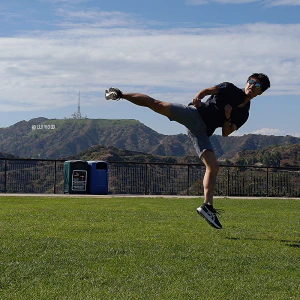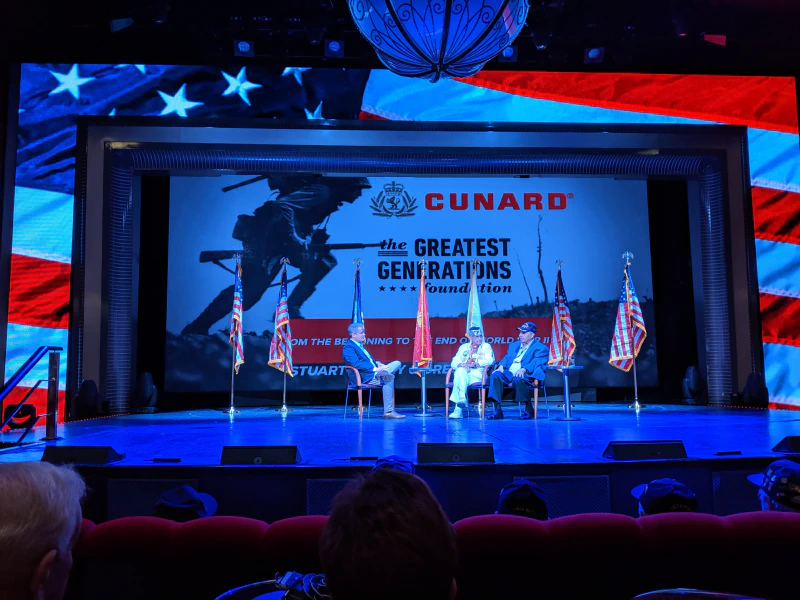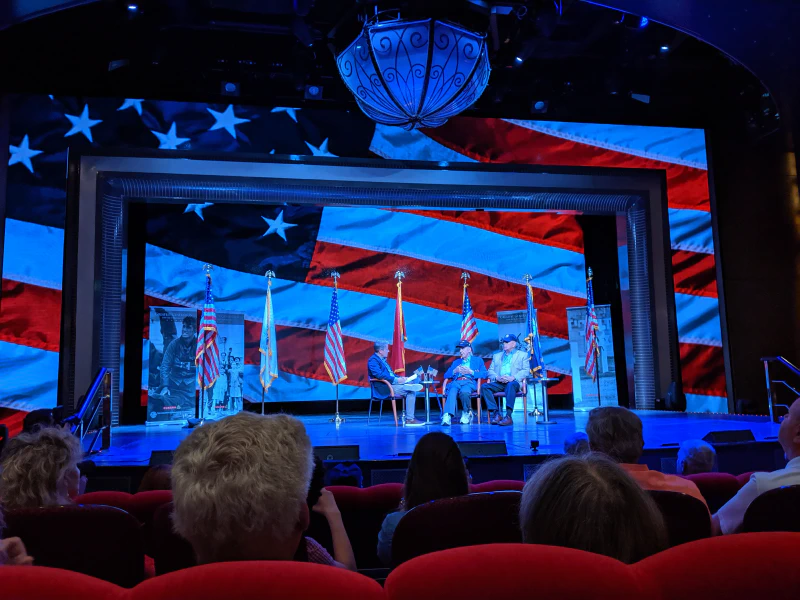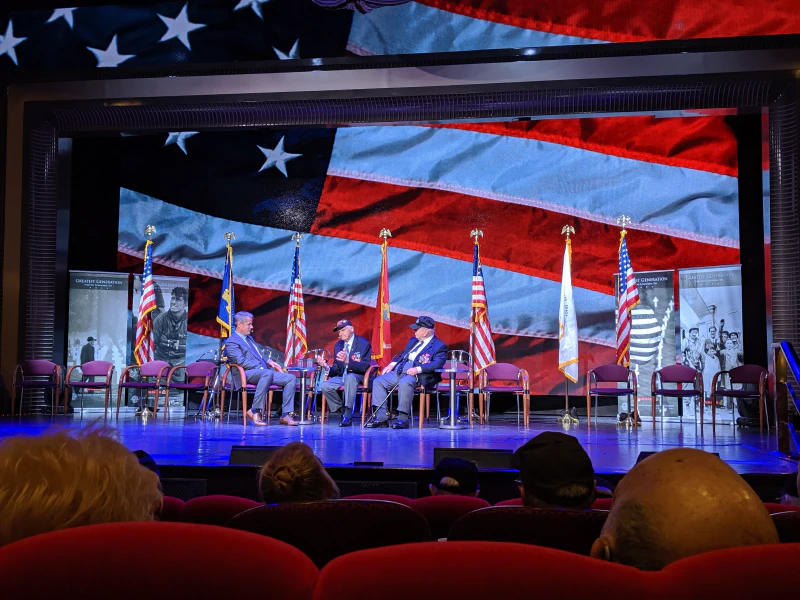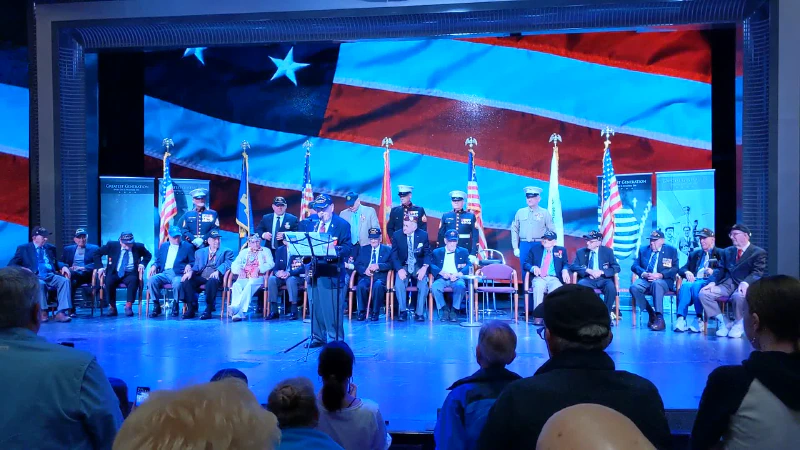Posted
on
in
Trip to D.C. and Transatlantic Cruise
• 3200 words
• 16 minute read
Tags:
Cruise, Queen Mary 2, WWII, Veterans
Instead of giving you a day-by-day on what we did on the crossing (I was told that it is not a cruise because only lowly peasants would go on a cruise), I’m going to just talk about some of the highlights and make some observations about my time on board the Queen Mary 2. We didn’t stop in any ports, so it was just what we did on board.
WWII Veteran Presentations
One of the main reasons we went on this cruise was because the Greatest Generations Foundation, a group which helps tell the stories of WWII veterans, was on board with 21 WWII veterans. The Cunard Cruise Line and the Greatest Generations foundation had coordinated events every morning where one or two of the veterans were interviewed by a host and were able to tell their stories about WWII. The host was a man from a local television station in Denver, so it was funny seeing him in person. In addition to the host, there were a few Vietnam War veteran “escorts” who helped the WWII veterans throughout the cruise.
The veterans’ experiences spanned the entire war. One of the veterans was a sailor on board one of the ships in Pearl Harbor on the December 7, 1941 while another veteran was the radio operator in Eisenhower’s war room on VE Day who sent the message that Germany had surrendered to the allies.
The one who was there at Pearl Harbor, Stu, was on a ship that was hit by a torpedo (maybe multiple torpedos, I don’t remember exactly) and was rapidly listing to that side. It was saved from capsizing due to the heroic work of some sailors on another boat who tore holes on the other side of the boat so that it sank straight down, rather than sideways. Stu escaped his ship by swimming to shore through water that was covered in burning oil from ruptured fuel tanks. He came up for breath once, in the middle of the inferno, and I remember him clearly saying “that was the hottest breath of air I’ve ever taken”.
A few of the veterans were captured and were held as prisoners of war, and one one of the days they related their stories. On Memorial Day, which happened during the cruise, they did a special session featuring the Vietnam Veterans presenting the colours. Then, they had a special guest join one of the veterans. General Matz, appointed by Donald Trump as the secretary of the American Battle Monuments Commission, talked about the work that the Battle Monuments Commission does to maintain the cemeteries, memorials, and monuments commemorating the sacrifices of the U.S. Armed Forces overseas.
On the last day of the crossing, one of the veterans played his saxophone. I was very impressed that he was able to do that, considering his age! They also had all of the veterans up on stage at that time, and I got a picture.
Many of the veterans on board participated in the D-Day landings. In fact, many of them are continuing on to the 75th Anniversary of D-Day commemorations that are taking place in Normandy on June 6th of this year. Two of the veterans parachuted into Normandy behind enemy lines on the night of June 5th, 1944. Another two or three were part of the Navy and Marine corps that bombarded Normandy, and took men onto the shores. I don’t remember if any of them landed on the shores or not. The unifying theme for all of them was that no Hollywood movie does the horrors of war justice. Saving Private Ryan was mentioned many times as being the closest approximation to the carnage. One of the veterans said that the real thing was like “tak[ing] Saving Private Ryan, and mak[ing] it ten times worse”. Another one said that “the main omission was the body parts strewn across the beach and in the water”. Hearing their accounts gave me a much greater appreciation for the slaughter that happened on the beaches of Normandy.
One veteran’s story was especially moving to me. It was Frank Divita, a man from New York City. He had a distinct New York accent, and in another life could have easily played the tough New York organized crime gangster in a movie (or in real life, for that matter). But his tough guy appearance melted away quickly when he began talking about his experiences in the war, specifically on D-Day. He was a Marine on one of the landing craft (LCMs) that took men to the shores on D-Day. His job was to lower the ramp to let the men out, but also let the German machine gun bullets in. He had moved to this position after his crewmate who was originally in that role had been killed. He talked about hearing the bullets hitting the front of the craft and freezing when he was supposed to lower the ramp. As soon as he lowered it, machine gun fire rained in. The two men next to him were hit immediately. He related his fear that he would be next. I think that Frank mentioned that one of the wounded beside him actually survived, despite taking multiple bullets. The other one was fatally wounded. As Frank talked about him, you could tell that he became very emotional. He talked about how the man was really no more than a boy, maybe 18 or 19 years old. As the boy lay on the floor of the LCM, he cried out for his mother. Frank said a prayer over him, and administered some morphine. “And then,”, said Frank, clearly having a hard time getting the words out, “he died.”. Watching this man, now in his 90s, who looked like your typical New York City tough-guy, nearly breaking down as he described what had happened to him three-quarters of a century ago was very impactful. I will never forget his story.
Making Some New Friends
On a lighter note, I met a bunch of people and made some new friends. Mom and I were at a table with two couples. One was from England, and one was from Sweden originally, but now live in California. The Swedish couple were heading over for the summer to their home in Sweden, and the couple from England were heading back home after having gone the other direction on the Queen Mary 2 last week. Both of the men were retired engineers. It seemed like quite a few of the people that we met were engineers, and mom and I decided that the reason for that was that engineers tend to make enough money to live comfortably and go on cruises, but not enough money to be in the large suites at the front of the boat with their own, more exclusive dining room.
I was initially worried that I would be the only one on board under 45, but luckily I was proven wrong almost immediately. Before we even left New York, I met a guy named Chase who is also 21. He is headed to Spain for the summer for a study abroad program. We hit it off immediately, since he was a history major, and I love history.
The next day, I met three teenage guys at the ping-pong tournament. They were
cousins and were onboard with their grandma. Two of them, Graham and Griffin,
are heading in to their senior year of high school while the other, Blake, is
heading into his freshman year (I think) of high school. We ended up hanging out
quite a bit during the cruise crossing. That evening, there was a Young
Adults get-together. I met quite a few more young people at that event. One of
them was Ryan, who just graduated with a degree in computer science and is going
to start at Raytheon. Also there were two sisters, Gretchen and Meghan, and
Trueman, and two young businessmen, Richard and Jakub, with their manager who
had somehow convinced their company to pay for the cruise instead of airfare.
I ran into another teenager, Aaron, on the third or forth day after going to a movie showing. He was very glad to find somebody younger, and he ended up hanging out with us some. There were a few other young people here and there, but I didn’t see much of them so they don’t get a mention here, mainly because I forgot their names… (I have gotten better at remembering names though, at the young adults get-together, I learned everyone’s names after maybe 20 minutes or so and there were around 10 people.)
Overall, I enjoyed meeting all of those people and hanging out with them. It was surprising how quickly we all fell into a routine. I think it’s a testament to the power of normalcy. Every day for me went something like this:
- Wake up right before the veterans presentation, and stumble into that at 10:00.
- Go eat some breakfast/lunch, sometimes running into some friends.
- Go to the pool for a few hours (normally with Chase or the cousins), and potentially go to some lecture or other event.
- Play in the ping-pong tournament. I almost always was out in the first or second round. Graham was way better and won a couple of the tournaments.
- On a few of the days, Graham, Griffin, Blake, and I we went with their grandma to afternoon tea.
- Go to afternoon trivia in the Golden Lion Pub. (I am not good at trivia, but I pretend to know what I’m doing and make everyone else on my team answer the questions.)
- Maybe hop back in the pool for half an hour.
- Get ready for dinner and go eat.
- Go to Wipeout Trivia and get destroyed again.
- Go to the show, listen to live music somewhere, or otherwise hang out.
- Go to bed.
It was fairly busy, but also relaxing at the same time. There was enough of a variety of activities that I was not bored. I was pretty proud of myself, I even went to the gym once. I played a couple of games of chess, too. When I don’t blunder, I can hold my own against most people who haven’t studied chess extensively.
Learning Something New
In addition to the veterans’ presentations, there were a few guest lecturers on board who gave talks about their topic of expertise. One man, Nigel West, was an expert in the history of intelligence, mainly of British Intelligence. (His real name is Rupert Allason, and he is a former politician in the UK Conservative Party.) He gave two lectures on the boat, one about GARBO, a double agent working for Britain during WWII, and the other on the Special Relationship between 10 Downing and the White House.
GARBO was the codename of Juan Pujol García, a Spanish double agent who worked with the British to give misinformation to German Intelligence. At the war’s outset, GARBO unsuccessfully attempted to lend his services to MI5, the British Intelligence agency but promptly went to the Germans in Spain to give his offer his “support” to them. They accepted. He moved to Lisbon (on the German’s dime) and began to send the Germans information about the British. He had never been to the UK, so his main sources of intelligence were what he read in British newspapers and at in the library in Lisbon. He began to build out a fake network of sub-agents who “fed” him information that he then forwarded on to the Germans. Eventually, the British took notice of GARBO’s potential as a double agent and had him moved to London where he continued to build out his “network” of spies. Despite many “setbacks” that GARBO faced (such as one of his “agents” conveniently falling ill and dying right before a massive troop movement), his intelligence was so “valuable” to the Germans that they did not attempt to set up any other spy networks. (In fact, the Germans were so saddened by the death of the fictitious sub-agent, that they gave his wife a pension, which GARBO took for himself.)
GARBO’s biggest achievement was his crucial role in Operation Fortitude which successfully deceived the German High Command, all the way up to Hitler himself, into believing that the Normandy Invasion was a diversion, and that the real landing would occur in the Pas-de-Calais. GARBO became so trusted by the Germans that even after they had lost the war, GARBO (known by the Germans as Alaric) was awarded the Iron Cross for his service to the Third Reich. GARBO also was awarded a Most Excellent Order of the British Empire (MBE) by Great Britain for his contribution to the war effort on the allied side. He is likely the only person to have received high honours from both sides during WWII.
The other talk was about the Special Relationship between 10 Downing and the White House. The basic gist of it was describing the way that American and British intelligence agencies have shared information and resources since the Second World War. The details of this one were not so memorable, but two of the anecdotes that he talked about highlight the cooperation very well.
First, during the Cold War, the British were unable to fund the technological developments required for intercepting and deciphering Soviet radio signals which bounced off of the ionosphere. The Americans did, however. The problem was that intercepting those signals which bounced off of the ionosphere required receivers to be placed in specific locations on the globe, locations where the Americans had no presence. The British, however, at this time still had a massive Empire, with land around the globe. Many of those British holdings were in strategic locations, perfect for intercepting Soviet radio traffic. Thus, the British gave the Americans control over portions on their land holdings, and the Americans provided the technology. To this day, many British holdings with military installations have more Americans that Brits.
The second anecdote had to do with submarines, specifically the British Nuclear Submarine Fleet. British nuclear submarines are autonomously commanded so that in the event of a catastrophic destruction of the British Government, each submarine can still operate and, if necessary, retaliate with nuclear weapons. In such an apocalyptic event, the way each submarine commander must act is dictated by the Prime Minister in the letters of last resort. Although confidential, and never known to anyone besides the Prime Minister until the letters must be opened, the letters say for the submarine commander to do one of four things: retaliate with nuclear weapons, do not retaliate, use his or her own judgement, or place the submarine under the command of the current occupant of the White House.
Both of the talks that I went to were extremely interesting, and I feel like I understand a little more about how intelligence agencies operate.
It’s Showtime!
One of the cool things about the ship is that there is a ton of entertainment options. There were movie showings almost every day, and every night there was a live show. Some of the movies were lame, and some of the shows were not interesting to me, but there were quite a few good performances and movies.
I watched three films while on-board the ship. First Man, Darkest Hour, and a Planetarium show. I will not belabour my reviews of these, as the first two are available for you to watch yourself, and the planetarium show was mediocre.
First Man is a film about the moon landing, from the perspective of Neil Armstrong. I thought it was a good film, and the cinematography was great. I have heard that people complained about it not showing the planting of the American flag on the surface of the moon, and I thought that was a clear omission. I don’t find it offensive though, the plot of the movie centred around the death of Neil’s daughter which occurred prior to his moon landing and his struggles to cope with that.
Darkest Hour was amazing. Gary Oldman who played Churchill was brilliant, and Ben Mendelsohn, who seems to be playing King George VI in films a lot these days, played the King. The film doesn’t really make much sense if you don’t know at least some of the history of Dunkirk and Neville Chamberlain. It also doesn’t make much sense if you don’t know anything about parliamentary politics. Luckily, a similar parliamentary situation to the one that occurred near the outset of WWII is occurring right now in Britain. The Conservative Party still has power, but Chamberlain was ousted as Prime Minister during a vote of no confidence; much like May was. The movie centres around the power struggle to determine the new leader of the Party, and the nation. (SPOILER ALERT) Churchill wins and leads Britain through the war. A tangential story is the relationship between Churchill and his secretary who helps him write his speeches. It is a brilliant film, and a fitting one considering the veterans on board, and the upcoming D-Day commemorations.
The show at the planetarium was cool, because I can now say that I have seen a show in a planetarium at sea, but other than that, it was not a great show. The imagery was good, but I didn’t think that it had a good narrative (in fact, I’m not even sure that it had a narrative at all). Anyway, it was a fun thing to get to do, regardless.
The live shows were good. The cruise line has singers and dancers that are contracted for six month periods, and they did three or four shows. They are decent, but not anything to write home about. However, they also bring on guest performers. The ones on this cruise were pretty good.
The best one, in my opinion, was a pianist. He was extremely enthusiastic, and you can really tell he was exerting himself as he played. He played a very large variety of pieces ranging from classical music to scores from Broadway musicals. At the very end of his second show, he took requests from the audience for songs to put together into a medley. The requests varied from Yellow Submarine to Flight of the Bumblebee. He took maybe 15 different songs, and wove pieces them all together with amazing transitions between songs.
The next best was the stand-up comedian. His humor was funny, clean, and totally accurate. I don’t remember much of the jokes, but I was laughing for most of it.
The last guest performer was a singer from the West End (London’s Broadway). She had a great voice, and I thought she was pretty good, but one show would have been enough. During the second show, I was with Graham, Griffin, and Blake and we decided to go somewhere for me and Graham to have a rematch game of chess outside of the theatre where we could still hear her as background music.
Overall, the crossing was a very enjoyable experience. I made some new friends, had the privilege of hearing from heroes of WWII, learned some things about intelligence and Parliamentary politics, and enjoyed some live shows.
